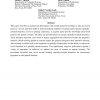Free Online Productivity Tools
i2Speak
i2Symbol
i2OCR
iTex2Img
iWeb2Print
iWeb2Shot
i2Type
iPdf2Split
iPdf2Merge
i2Bopomofo
i2Arabic
i2Style
i2Image
i2PDF
iLatex2Rtf
Sci2ools
115
click to vote
CONSTRAINTS
1998
1998
Learning Game-Specific Spatially-Oriented Heuristics
This paper describes an architecture that begins with enough general knowledge to play any board game as a novice, and then shifts its decision-making emphasis to learned, game-specific, spatiallyoriented heuristics. From its playing experience, it acquires game-specific knowledge about both patterns and spatial concepts. The latter are proceduralized as learned, spatially-oriented heuristics. These heuristics represent a new level of feature aggregation that effectively focuses the program’s attention. While training against an external expert, the program integrates these heuristics robustly. After training it exhibits both a new emphasis on spatially-oriented play and the ability to respond to novel situations in a spatially-oriented manner. This significantly improves performance against a variety of opponents. In addition, we address the issue of context on pattern learning. The procedures described here move toward learning spatially-oriented heuristics for autonomous programs...
| Added | 22 Dec 2010 |
| Updated | 22 Dec 2010 |
| Type | Journal |
| Year | 1998 |
| Where | CONSTRAINTS |
| Authors | Susan L. Epstein, Jack Gelfand, Esther Lock |
Comments (0)

